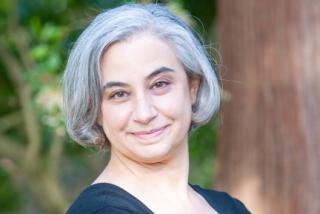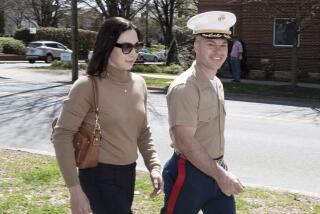Birth Parents to Get Twins, Judge Rules : Custody: Court finds that U.S. law to protect Native American heritage prevails over adoptive regulations.
- Share via
Twin 19-month-old girls will be removed from the home of their adoptive parents and returned to their birth family under a judge’s ruling Wednesday that is intended to protect the children’s Native American heritage.
The decision by Los Angeles Superior Court Judge John Henning--acting under a federal law that dictates that the bonds of Indian culture prevail over standard adoption rules--effectively tore apart one family and resurrected another.
Adoptive parents Jim and Colette Rost emerged from Henning’s Monterey Park courtroom late in the afternoon weeping over the loss of Bridget and Lucy, the girls they have raised almost since birth.
“I’m beyond the grief-stricken stage to the determined and angry stage,” said Colette Rost, whose lawyer has given notice of an appeal. “We are not going to let this drop.”
“I’m going to miss them,” said Jim Rost. “I’m going to miss getting up with them in the morning. I’m going to miss their smiles. And I’m going to worry about them.”
Across a lobby at the Edmund D. Edelman Children’s Court, Richard (Rick) and Cindy Adams of Long Beach--both part Native American--smiled and quietly made plans for the girls, whom they had agreed to give up before their birth in November, 1993.
Rick Adams, 23, who 16 months ago reversed his decision to give up the girls, said he was “extremely happy to have the children back and to be a family.” He added: “I want to be there for them. The way I should be.”
With the intense media interest in the case, including the threat of one talk radio host to blockade the exchange of the children, Henning ordered that the time and place of the transfer be kept secret.
The girls will initially be cared for by Adams’ parents, West Covina residents who were deemed more financially able to provide for them than the children’s biological parents.
Wednesday’s action brought an emotional climax to a protracted, cross-country legal battle that began when the girls were 3 months old.
At odds in the case were questions of children’s rights, Native American culture and sovereignty, and the competing rights of adoptive and birth parents.
Under state law, reporters were excluded from the courtroom Wednesday. But Henning and six attorneys involved in the case agreed to allow a tape to be played of a key portion of the proceedings.
In the recording, Colette Rost could be heard weeping and quietly gasping for air as Henning announced that he would hear no further arguments on whether the birth parents were competent to raise the girls.
While Henning said he had great sympathy for the Rosts--calling them “innocent” in the case--he said federal law obligated him to recognize the preeminent rights of the Adamses, their extended families and tribes to adopt the children.
“The ingredient that was left out in this whole situation was the interests of the tribe,” Henning said. “That is the [prevailing] law in this matter. . . . And it would be unnecessary, unwarranted and extremely painful that this go any further.”
Henning and most of the lawyers saved their sharpest criticism for D. Durand Cook, the Beverly Hills attorney who originally brought the two couples together and arranged the adoption.
The lawyers said Cook failed to disclose to the Rosts and an adoption agency that the birth parents were both part Indian, which made their children subject to the Indian Child Welfare Act. Congress passed the law in 1978, after finding that native tribes were being decimated by adoption.t The law gives tribes extraordinary powers to prevent their youngest members from being adopted by outsiders.
The Rosts, who live in Columbus, Ohio, said in previous interviews that they would have been extremely wary if they had known of the twins’ Indian heritage, realizing the adoption could be in jeopardy.
“Mr. Cook clearly failed in terms of his responsibility to his clients in this case,” Henning said. “Had he addressed these issues in the initial interview, we would not all be here today.”
“The Rosts were good people. They are good people,” Henning said, “and they have a right to an apology as to what happened by Mr. Cook. And I am very ashamed on behalf of this court as to what happened to the Rosts.”
The adoption had begun in 1993 in a spirit of harmony and cooperation, when Jim and Colette Rost flew west from Columbus, where he is a construction engineer and she a medical technician, to meet Adams, now 23, and Cindy Ruiz, now 22, who were struggling financially.
Adams and Ruiz, who have since married, already had two sons out of wedlock and felt that they would have trouble making a better life if they kept the twins. When a relative heard of adoption specialist Cook through a radio ad, the couple met the lawyer and were soon introduced to the Rosts.
The two families got along and agreed to the adoption. However, three months later, Adams had second thoughts and launched his efforts to get his children back.
The adoption, set to be final after six months, now will apparently never be completed.
The twins’ biological parents had initially notified Cook of their heritage and included the information in initial intake forms, several parties to the case said.
But the couple said d Cook advised them against mentioning their Native American heritage on the final adoption forms, lest they discourage adoptive families.
Cook did not return several phone calls seeking comment Wednesday.
Without the complex federal Indian law to slow the process, the adoption proceeded without a hitch, with Colette Rost sitting in the delivery room when the raven-haired girls were born. Within 10 days, the Rosts were back in Ohio with their new daughters and their biological daughter, now 8.
When the biological parents staked their claim, the Rosts fought back, saying that the girls were only one-thirty-second Indian and, more recently, uncovering evidence that they said proved the biological parents would be unfit parents.
The Rosts’ lawyer was prepared to present evidence of several calls to police from the couple’s home about domestic violence and a 1994 restraining order in which Ruiz said she had been subjected to “extreme violence” by her then-boyfriend. The court declaration also stated that Adams had choked, shaken and dropped his two boys, sometimes to vent his anger against Ruiz.
The birth parents’ attorneys argued, though, that the Rosts were misrepresenting the young couple in a desperate attempt to preserve their family. They said Richard and Cindy’s Indian bloodlines had been vastly understated by the Rosts--that she is half Yaqui and he one-quarter Pomo. More important, though, the family says that decisions about who belongs to their tribes should be theirs, not white society’s.
“This is something they do not discuss. They believe it demeans their culture,” said James Cohen, who represents the Pomo tribe.
As to the domestic violence claims, the couple’s attorneys said Cindy Ruiz overstated the level of violence so she could get a room at a women’s shelter. The birth parents say they have made significant strides in the last year, with the Adams training to be a security guard and his wife working as a service station cashier. They and their boys, ages 2 and 4, share a one-bedroom apartment.
But Jim and Colette Rost, both 40, said they have great concerns about how the twins will be reared.
“Who is looking out for the children?” Colette Rost asked Wednesday outside court. “Who cares about what is best for them? The judge has not even met these children or looked them in the eyes, but he is deciding their fate.”
The couple said they are particularly galled that the young birth parents lied about their heritage, “betrayed” an agreement they initiated, then showed no remorse. “They wanted us to take these children and now they are changing a decision they made with open eyes,” said Jim Rost. His wife added: “And no one has apologized.”
Attorney Leslie Ann Glick, who represents Richard Adams, portrayed her client as an unsophisticated young man who “had no understanding about the significance of not stating his Indian heritage. . . . He feels really badly about it and really badly about what happened to the Rosts.”
Karen Adams, the paternal grandmother who has been a force behind efforts to regain Lucy and Bridget, said her whole family, and a tribe beyond, is prepared to receive the children with love.
“I know the pain [the Rosts] feel, because I felt the same pain when I realized I had two granddaughters I didn’t even know,” she said.
More to Read
Sign up for Essential California
The most important California stories and recommendations in your inbox every morning.
You may occasionally receive promotional content from the Los Angeles Times.











